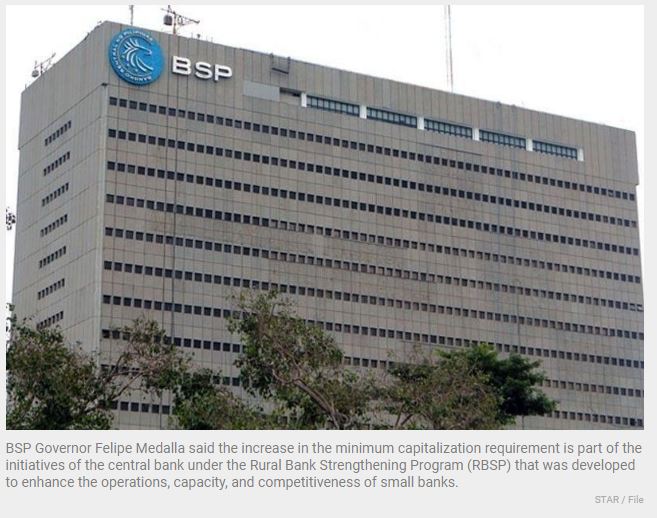Philippines: BSP hikes rural banks’ minimum capital requirements to P50 million
MANILA, Philippines — The Bangko Sentral ng Pilipinas (BSP) has raised the minimum capital requirements for rural banks to at least P50 million to further strengthen the country’s banking sector.
BSP Governor Felipe Medalla said the increase in the minimum capitalization requirement is part of the initiatives of the central bank under the Rural Bank Strengthening Program (RBSP) that was developed to enhance the operations, capacity, and competitiveness of small banks.
“A strong capital base enables rural banks to enhance their risk management systems, upgrade resources and manage operational costs, meet prudential standards, and accelerate digital transformation,” Medalla said.
The central bank’s Monetary Board issued Resolution 1145 dated Aug. 4, 2022 approving the amendments to the relevant provision of the Manual of Regulations for Banks (MORB) aimed at increasing the minimum capital requirements for rural banks.
Under the new capital structure, the minimum capitalization of rural banks would be P50 million for those with a head office and only up to five branches, P120 million for those with six to 10 branches, and P200 million for small banks with more than 10 branches.
Branch-lite unit of rural banks are not included in the number of branches.
The required minimum capitalization would also be imposed on those establishing a new bank, converting an existing bank from a lower to a higher category bank and vice versa, as well as those relocating the head office of a thrift bank to an area of higher classification.
Under previous regulations, rural banks must have a minimum capitalization of P10 million to P200 million depending on the location and number of branches.
According to Medalla, rural banks that comply with the new capital levels have to submit to the BSP a certification within 10 banking days from the date of effectivity of Circular 1151.
The BSP chief said that rural banks that fail to meet the the capital levels mandated in the new minimum capital requirements should refer to the available options under the RBSP.
“Rural banks availing of the capital build-up track shall submit to the BSP an acceptable capital build-up program within three months from the date of effectivity of this circular,” Medalla said.
lf the prescribed minimum capital necessitates an increase in the authorized capital stock, the regulator said affected small banks should include the corresponding amendments to their articles of incorporation.
According to the central bank, the appropriate supervising department would evaluate the continuing compliance of rural banks with the capital build-up program.
The regulator also clarified that existing rural banks already authorized by the Monetary Board to establish a rural bank, but are not yet operating, or persons from whom completed applications have been received, but are pending action by the BSP would be given five years to meet the new minimum capital requirements.
“The BSP reserves the right to require appropriate actions and/or impose sanctions for non-compliance with the capital build-up program on rural banks concerned, as provided under existing banking laws and BSP rules and regulations,” it added.
Since the COVID-19 pandemic in 2020, the central bank’s Monetary Board has ordered the closure of 26 problematic banks nationwide.
This year alone, the BSP has ordered the closure of eight problematic banks including Rural Bank of Polomolok (South Cotabato), Banco Rural de General Tinion, Farmers Savings and Loan Bank, Metro-Cebit Public Savings Bank, Rural Bank of Mahaplag (Leyte), Rural Bank of Salcedo (Ilocos Sur), Rural Bank of San Lorenzo (Siniloan) and Rural Bank of San Nicolas (Pangasinan).
Source: https://www.philstar.com/business/2022/09/02/2206713/bsp-hikes-rural-banks-minimum-capital-requirements-p50-million-


 Thailand
Thailand




